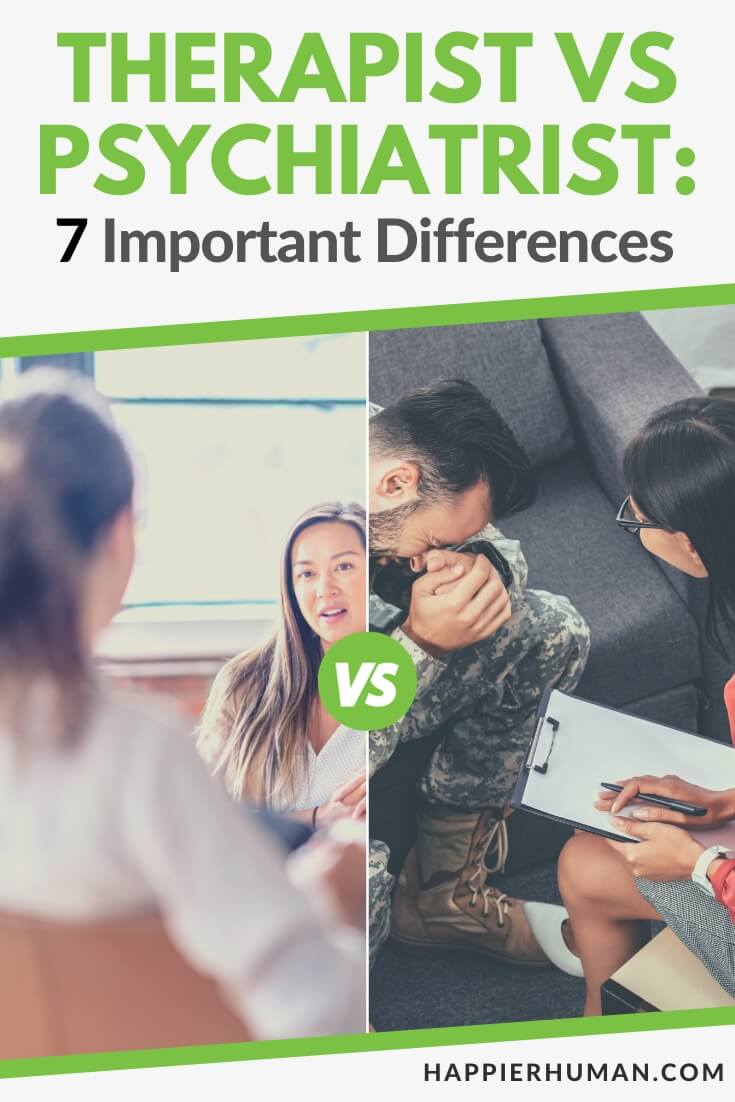There might be affiliate links on this page, which means we get a small commission of anything you buy. As an Amazon Associate we earn from qualifying purchases. Please do your own research before making any online purchase.
There are days when you just need help. You feel utterly overwhelmed, out of your depth, and bowled over by life. Your brain runs out of feel-good power, and you hit rock bottom, your mind just abandoning all hope.
This is the point when you consider the pros and cons of a therapist vs psychiatrist, trying to decide which is best to help you find your feet again. Before you rush to make an appointment, pause and consider what you need from a consultation.
This guide explains what a psychiatrist does differently from a therapist or psychologist, so you can make the most informed decision possible. It’s time to find the best mental health practitioner for you.
What Is a Therapist?
The term “therapist” can be loosely used to describe a counselor or psychologist who engages in talk therapy or psychoanalytic therapy or even cognitive processing therapy (CPT) to name but a few methods of therapy treatment options.
Essentially, a therapist helps you repair your mental health through talking about it, practice behavior modification exercises, and implement a recovery plan, so you can overcome your mental health challenges.
With therapist consultations, you begin to take ownership of your mental state, and it’s up to you to overcome your challenges to heal, such as dropping unhealthy coping mechanisms.
A therapist is usually a licensed healthcare professional, such as a psychologist or social worker. Therapists may specialize in specific treatment areas, such as dealing with substance abuse, marital counseling, or teen counseling.
According to law, a therapist isn’t licensed to prescribe scheduled medication, though they may make helpful suggestions regarding supplemental over-the-counter (OTC) medication to help manage your symptoms.
Who Sees a Therapist?
If you wonder whether you should see a therapist or a psychiatrist, the following conditions are the field of therapists:
What Is a Psychiatrist?
A psychiatrist is a doctor of mental health and medicine, and it’s someone who has specialized in mental health illness.
They have the license to make official diagnosis of mental health illness and prescribe scheduled medication to help manage various symptoms, such as severe depression, anxiety, and hysteria.
While some psychiatrists may offer therapy as part of their assessment approach, they mostly specialize in diagnosis of mental health conditions and the prescription of medication.
Who Sees a Psychiatrist?
Seeing a psychiatrist is usually determined by the requirements of your mental health condition.
Once there is cause for concern about your mental health state, you may be referred to a psychiatrist by a medical doctor or a psychologist. Usually, you would see a psychiatrist for:
Benefits of Seeking Mental Health Help
Mental health has made huge leaps forward since the dark ages when those with a personality disorder were seen as possessed.
Today, we are more understanding of the extent to which the mind can inflict harm and pain on people. Seeking mental health help is no longer a taboo.
There are several benefits to seeking professional help from either a therapist or psychiatrist, including:
Not feeling alone
When you have a mental health challenge, it can quickly feel like it’s you against the world, so having a professional who can help and advise you can really help you feel seen and heard.

Therapy and medical diagnosis can help you feel like you’re not alone or “insane,” which can give you hope for the future.
Managing chemical problems effectively
With the correct diagnosis, you can receive a script from a psychiatrist, which can help you manage chemical imbalances in the brain. If you have a deficiency of a neurotransmitter like serotonin, you can’t “think” your way out of it.
Formulating coping strategies
With professional guidance, you can develop coping strategies for your daily challenges like how to manage your depression or feelings of inadequacy.
You can learn how to journal for healing, create vision boards to help you plan for a healthier you, and engage in self-care so you can build a healthier mindset.
Getting professional advice on mental health challenges
When you struggle with daily living because of a harmful or negative mindset, it can really help to talk things through with a therapist, who will provide you objective advice and guidance.
Tracking your improvement
With regular visits to a mental health professional, you can track your progress thanks to their feedback and advice.
7 Differences between Therapists and Psychiatrists
When you are experiencing a problem that affects your daily life, making basic activities problematic, you should seek mental health guidance and treatment. Knowing which mental healthcare professional to see depends on what your problem presents as.
Here are a few differences between therapists and psychiatrists to help you decide who to see.
1. Pop a Pill or Talk
If you want a quick fix, then you’re probably thinking that you can pop a magic pill and be all better. While this may work if you have a serious chemical imbalance in your brain, it’s unlikely to work with most mental health issues.
If you need medication, you will likely see a psychiatrist as they are licensed to prescribe scheduled medication, such as antipsychotics, anticonvulsants, antidepressants, and more.
Usually, they would consult with you and establish a basic diagnosis of what seems to ail you.
The psychiatrist then prescribes the most appropriate medication to help you manage your symptoms. Usually, they prescribe a low treatment dose to first establish whether the medicine works with you.

However, a pill won’t fix the underlying cause, unless you have structural brain damage (that affects brain chemistry). So, to fix your problem’s cause, you need a therapist or psychologist to help you reflect, dig deep, and identify where your challenges started.
A therapist may also recommend that you consult with a GP or psychiatrist for a prescription to help you manage while you start using coping strategies.
2. Specialized Skills
When a psychiatrist applies to a new center to work at, they are required to have the following skills (acquired through years of study):
A therapist needs the following skills (based on their training and education):
3. Cost and Their Salary
When you see a therapist, the cost is usually not too high per session, depending on their field of specialization and popularity.
The cost per session can be anywhere from $5 to $200 and more. However, a psychiatrist may cost much more per session, with average consultations from $150 to $500.
You will likely require fewer sessions with a psychiatrist, which may actually lower your overall cost, excluding medication. A therapist may require weekly follow-up sessions to track your progress, which can end up costing more (for a pricey psychologist).
Yet, on average, a psychiatrist will gross $270,000 per year, while a psychologist (or therapist) will earn up to $170,000 per year (or as little as $58,000). Social workers and other therapists will earn less, depending on their modality and specialization.
4. Availability
Psychiatrists study for about 12 years (including their four-year residence) to be fully licensed. Psychologists (who are the most qualified therapists) study five to seven years, including supervised residencies.
Since it’s a greater time commitment and much more intensive field to study, fewer psychiatrists go on to practice mental health medicine. So it’s harder to find a psychiatrist to consult with.
Psychologists more frequently manage the five to seven year commitment and go on to practice as a licensed therapist. So you can more easily book an appointment with a psychologist.
Social workers and licensed therapists may study for a few years, though usually less than a psychologist.
Psychiatrists are not as easily available as psychologists, therapists, social workers, and counselors.
5. Area of Expertise
Therapists can either practice general mental health therapy, or they can specialize in different therapy approaches or different fields of psychology, such as specializing in CBT, drug addiction, and treating couples during marriage counseling.
While a therapist will have a good knowledge of treatment options for their chosen field of specialization, they aren’t necessarily experts at it.

Psychiatrists study in more depth, and they also specialize in an aspect of mental health disorders (so not basic depression or anxiety).
You can expect a psychiatrist to specialize in addiction, neuropsychiatry (changes in the brain), forensic psychiatry (working in the legal system), and child and adolescent psychiatry.
6. Where They Work
Both psychiatrists and therapists may work at hospitals and advanced mental health facilities such as treatment centers.
Usually, the psychiatrist is in charge of several psychologists, who have to run their treatment protocols past the psychiatrist for approval.
Psychologists and psychiatrists may work in private practice too. Unlike psychologists and psychiatrists, other therapists don’t necessarily work in hospitals, though they may also work at therapy centers and rehabilitation facilities.
7. One Similarity
Finally, there’s one similarity that psychiatrists and other therapists share—the best care of their patient.
In fact, psychiatrists may work with other therapists to achieve the best healing and results for their patient, targeting their mental health challenges with a tandem approach of medication and therapy.
Final Thoughts on Therapist vs. Psychiatrist
When deciding whether to see a psychiatrist or a therapist, it need not be a mutually exclusive decision. You can still consult with a psychiatrist while seeing a therapist for talk therapy and other mental health techniques.
Ultimately, it comes down to the treatment that works best for your unique mental health challenges.
If your environment causes you significant stress that affects your brain’s chemical production, you won’t heal if you don’t receive medical assistance (aka pills).
But if you don’t develop coping strategies, you won’t survive or thrive in that environment, which is why you need talk therapy.
Did you know that the brain learns best when it does so vicariously? It’s one of our most primitive learning methods, which is why group therapy sessions are so beneficial—you learn from others. Learn more in our guide to the long-term benefits of group therapy.
And if you want more articles on mental health, be sure to read the following articles:
- What to Talk About in Therapy? 22 Topics to Consider
- Play Therapy: A Simple Guide to Getting Started
- 9 Tips to Avoid the News to Reduce Your Life Stress
Finally, if you want to identify YOUR personality type, then take one of these 11 personality tests to better understand what makes you tick.


